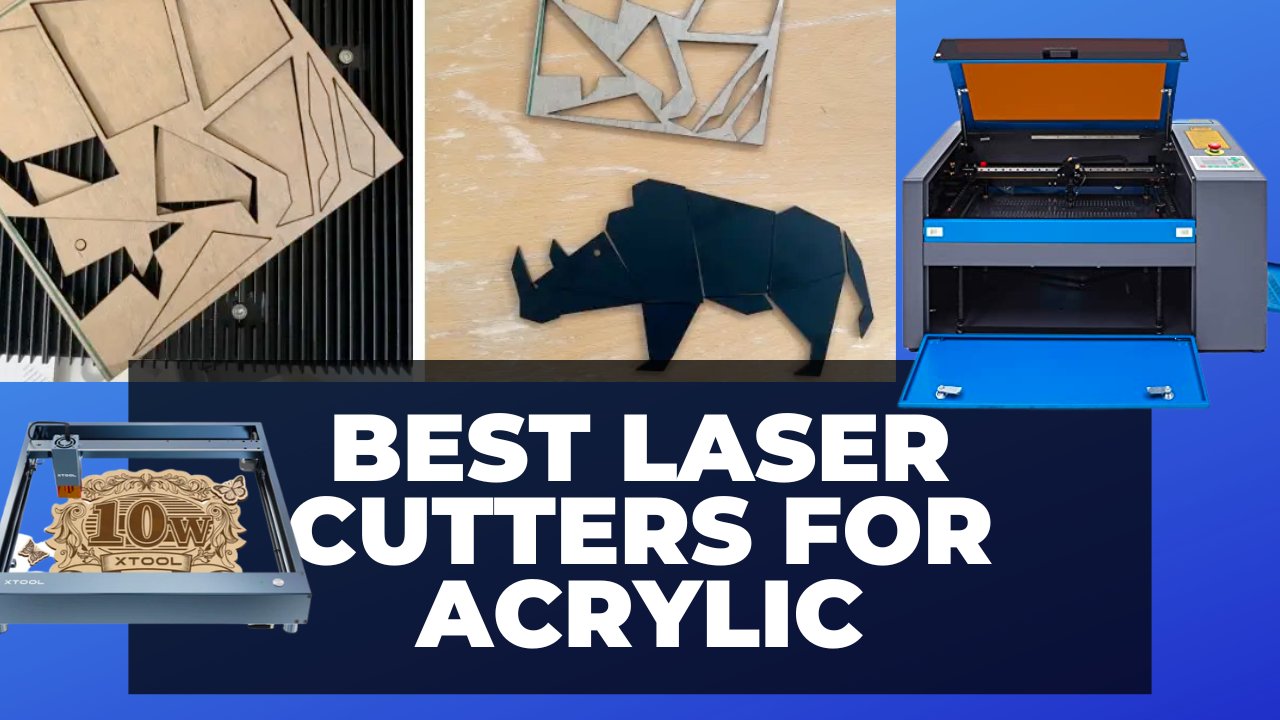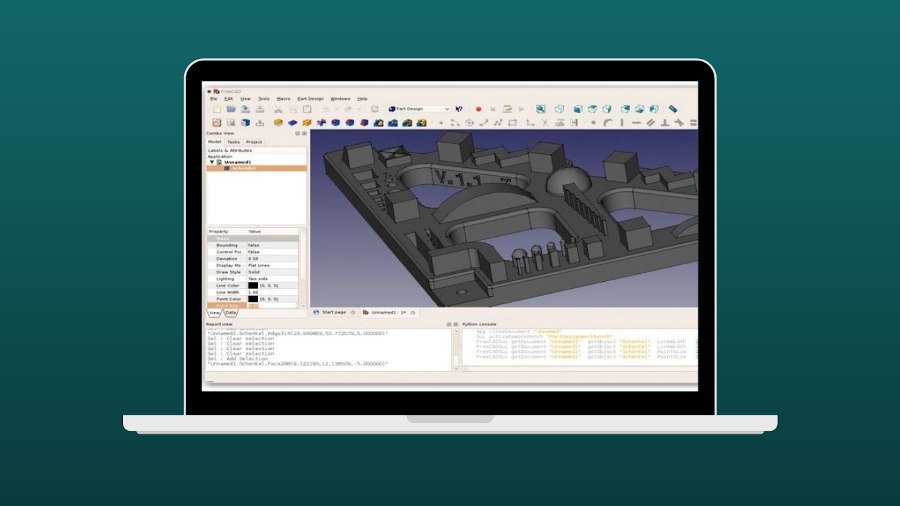The Maslow CNC is a unique, almost legendary CNC router for offering an enormous 4×8 foot working area, for such a low price (around $500).
But, despite its popularity and enormous working area, it suffers in other areas, leading to many makers searching for Maslow CNC alternatives.
For example, the Maslow team’s commitment to bringing large format CNC work to the average hobbyist means that while cheap, it’s not the highest quality router on the market.
Its unique upright construction, which requires you to build a frame to support the drive chains and sled, makes it more awkward to use than your standard tabletop router and is another factor that puts some people off.
So, what are the best alternatives to the Maslow CNC? We’ve reviewed four CNC routers that solve some of the problems presented by the Maslow.
1. MakerMade M2
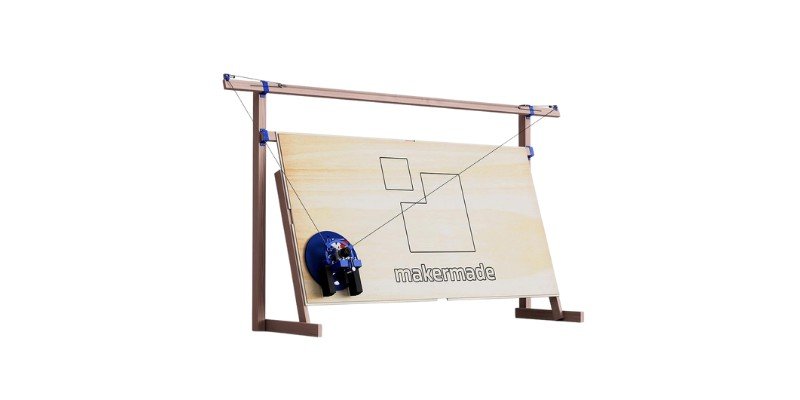
Pros
A great upgrade over the Maslow CNC.
It does everything the Maslow does but with significant improvements.
More accurate than the Maslow.
Cons
Will cost a good bit to buy or upgrade.
There’s no doubt that the MakerMade M2, produced as the direct upgrade to the Maslow, is the most similar and viable alternative.
It does everything the Maslow does but with significant improvements and is a more professional alternative to what began as an open-source, community-driven project.
The M2 retains the 4ft x 8ft working area the Maslow CNC is famed for, as well as the upright frame construction, but it’s a more powerful machine.
For example, the M2 DUE control board, based on GRBL, is a big upgrade on the Maslow 1.2 board and allows you to achieve up to 40% faster cutting. You can cut up to 40” per minute with the M2, and it’s also very precise, able to achieve accuracy up to 0.005” with proper calibration.
Another difference is the ability to add a 2.8W diode laser module from MakerMade M2.
This includes a laser module from JTech Photonics and a mounting kit that’s specifically designed for the M2, allowing you to achieve accurate laser engraving on large sheets of aluminum and other materials – something you can’t do with the Maslow.
Other upgrades include 1.8” bits instead of the old 1.4” ones, a metal Z-axis assembly for smoother and more reliable movement, and a spring for chain tension that keeps the chain far more taut than the Maslow’s elastic ties.
Some similarities remain, such as the need to use Makerverse software, purchase a router separately, and need to build a frame, but if you’re looking for the cheapest high quality 4ft x 8ft router, you’ll struggle to find better than the M2.
Check out my MakerMade M2 review for a more in-depth look at this CNC machine.
2. Sainsmart Genmitsu 4030 PROVer XL
- Price — Check price on Amazon here
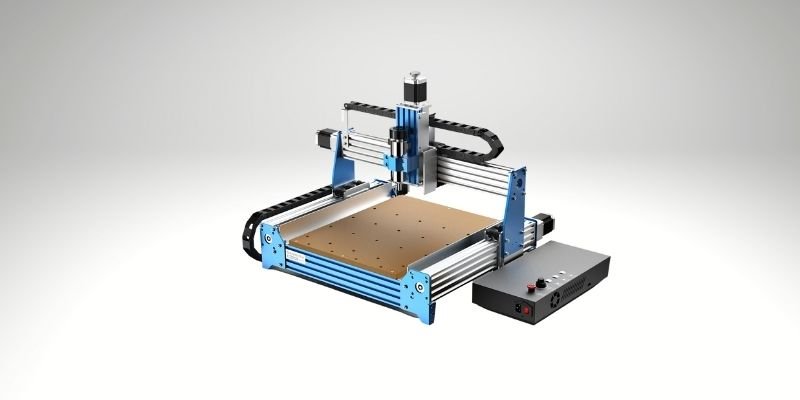
Pros
Easier to set up and operate than the Maslow CNC.
Suitable for aluminum cutting.
Great if you’re looking for a fine balance between cost, working area, and quality.
Cons
Smaller working area.
The Sainsmart Genmitsu 4030 PROVer XL is different from the Maslow CNC and MakerMade M2 due to it being a smaller, traditional tabletop router, but it’s still a viable alternative for several reasons.
For example, while the 400x300x110mm working area is significantly smaller, you can expand this to 24”x24” with the 6060 extension kit.
So, you can get a generous working area – more so than most other routers in this price range – without having to break the bank.
Crucially, the traditional tabletop design of the Genmitsu 4030 PROVer XL makes it much easier to set up and operate than the Maslow CNC or MakerMade M2.
It has an impressive all-aluminum frame that makes it incredibly durable, rigid, and sturdy, which in turn allows you to achieve high cutting precision.
Whereas the Maslow doesn’t come with a router included, the PROVer XL comes with a 300W router included which saves you from having to buy one.
While you can cut aluminum with this CNC router, neither it nor the Maslow CNC are ideal metal cutting machines.
Overall, the 4030 PROVer XL is one of the best alternatives to the Maslow CNC if you’re looking for a fine balance between cost, working area, and quality.
If you want to learn more, check out my Sainsmart Genmitsu 4030 PROVer XL review.
3. BobsCNC Evo 4
- Price: Check price at Amazon here
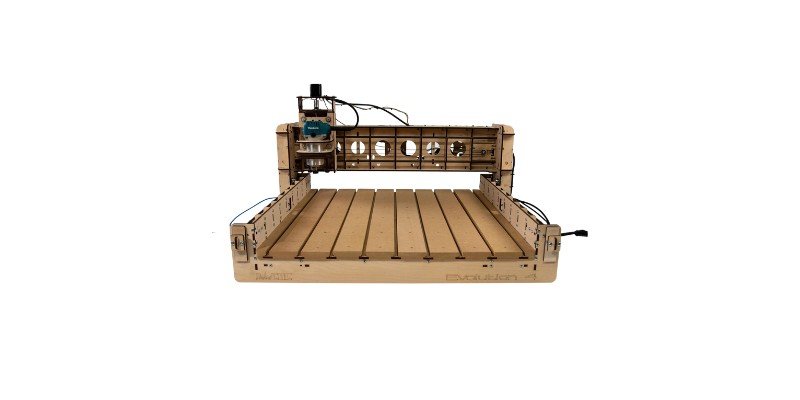
Pros
Can achieve high accuracy.
Fantastic design and construction.
Low price.
Cons
Not ideal for cutting metal.
The BobsCNC Evolution 4 is in some ways quite similar to the Maslow CNC, in that it makes certain sacrifices for the sake of keeping the price down and accessible to hobbyists.
In the case of the Evo 4, this router is constructed entirely from laser-cut wood, rather than the aluminum construction seen in most other CNC machines.
However, while this may raise an eyebrow if you’ve never come across the Evo 4 before, the CNC machine’s fantastic design and construction help to minimize the impact.
In fact, you can still achieve very high accuracy with this router, with repeatability ranging from just 0.002” to 0.004”.
This is thanks to the use of high-quality components like the SG20U supported rail system and lead Acme nut on the Z-axis.
The main benefit of keeping the price low with the wooden frame is that it allows this router to provide a much larger working space than most other similarly priced routers. With a cutting area of 24”x24”, it’s a great choice if you want to work on medium size projects like small furniture.
It comes with the popular Makita RT0701C variable speed router included, and you can expand your Evo 4’s capabilities with upgrade components such as the JTech Photonics laser module.
This CNC router is best suited to woodworking and isn’t ideal for cutting metals. If you’re looking for a viable aluminum cutting alternative to the Maslow CNC, check out the next review.
Read more: BobsCNC E4 review
4. Shapeoko 4
- Price: $2,300 — Available at Matterhackers here
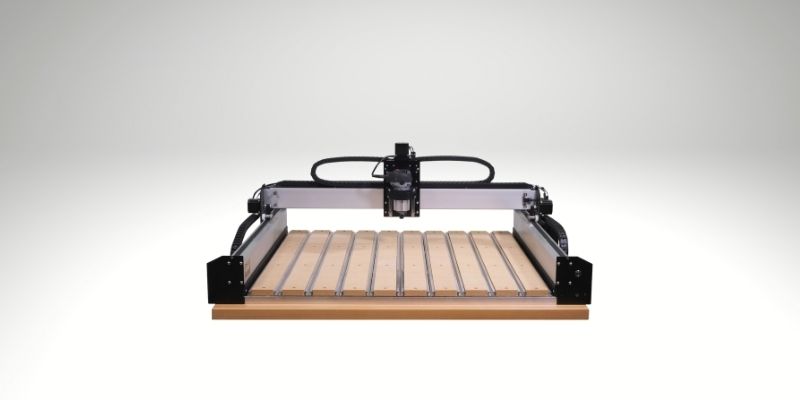
Pros
One of the best hobbyist routers you can buy.
One of the finest routers for aluminum cutting.
Capable of cutting wood up to twice as fast as other similarly priced CNC routers.
Cons
Pretty expensive.
Carbide 3D’s Shapeoko 4 is another more conventional CNC router, but it’s one of the best hobbyist routers you can buy and is a good alternative to the Maslow CNC if you’re looking for a premium option.
As I’ve already touched on, this is one of the finest hobbyist routers for aluminum cutting, beating out other popular routers, such as the X Carve, as I explain in my X Carve vs Shapeoko 4 review.
It’s not only aluminum cutting the Shapeoko 4 excels at.
It’s also capable of cutting wood up to twice as fast as other similarly priced CNC routers, all whilst maintaining high levels of accuracy.
This is largely due to the impressive design and high-quality components used in this machine.
It has aluminum extrusions that ensure lots of rigidity and stability, and the stiff, wide belt drives on the X and Y axes, along with the lead screws on the Z-axis, provide smooth and precise linear motion.
The Shapeoko 4 is available in three different sizes, so you can take your pick depending on your space, budget, and requirements:
- The Standard has a 17.5”x17.5”x4” cutting area
- The XL has a 33”x17.5”x4” cutting area
- The XXL has a 33”x33”x4” cutting area
Another benefit of the Shapeoko 4 is that the parts come preassembled, making it much easier to set up than the Maslow CNC.
It also comes with proprietary software programs – Carbide Create for designing and Carbide Motion for controlling your machine – both of which are intuitive and powerful.
Finally, you can further improve your Shapeoko 4 with a wide variety of upgrades, including a Z-axis upgrade and a laser module, so this is undoubtedly one of the best Maslow CNC alternatives.
Other articles you may be interested in:
- The best DIY CNC routers
- The best CNC routers for small businesses
- The best CNC mills
- The best 4×4 CNC routers
- Alternatives to the Pocket NC 5 axis CNC mill

